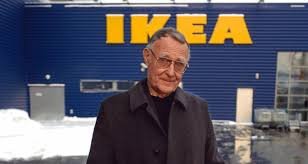
- Though Kamprad stayed largely out of the media spotlight, rarely giving interviews or personal statements, he did write a document in 1976 that explains the ethos of the company, called The Testament of a Furniture Dealer. Namely, that the goal and guiding force behind the company’s decisions would be to put the needs of the user at the forefront. “The many people usually have limited financial resources. It is the many people whom we aim to serve,” Kamprad wrote. “The first rule is to maintain an extremely low level of prices. But they must be low prices with a meaning. We must not compromise either functionality or technical quality.”
2.Kamprad was so concerned with saving money that he was widely nicknamed “Uncle Scrooge” and “The Miser.” He owned a Volvo, always flew coach and made sure that when his leadership team traveled for business, they stayed in the least expensive hotels. He eschewed a more corporate look of suits and ties, and if there was an opportunity to recycle something or snag some condiments from a restaurant, he would. While you may not go to Kamprad’s extremes -- though he owned some expensive properties, it turns out -- it is important to make the most of the resources you have at your disposal. Because, as he once, wrote, “Time is your most important resource. You can do so much in 10 minutes. Ten minutes, once gone, are gone for good. You can never get them back.”
Kamprad started his first business when he was 5 selling matches around his neighborhood, graduating to Christmas ornaments, fish, pencils and seeds. Ikea didn’t just always sell furniture. That part of the business started in 1948, but for those first few years, after he launched the mail-order company at 17, he sold items such as nylons, pens and wallets out of a repurposed milk truck. A good reminder that where you begin and where you end up may look very different.
“A job must never be just a livelihood,” Kamprad wrote. “If you are not enthusiastic about your job, a third of your life goes to waste.” He believed that the Ikea spirit was built on a foundation of enthusiasm and that without it, it was impossible to strive for great things, lead or motivate colleagues.
Kamprad was of the school that if you aren’t making mistakes, you’re not trying hard enough. "Only while sleeping one makes no mistakes. Making mistakes is the privilege of the active -- of those who can correct their mistakes and put them right,” he wrote. “Our objectives require us to constantly practice making decisions and taking responsibility, to constantly overcome our fear of making mistakes. The fear of making mistakes is the root of bureaucracy and the enemy of development."
We will forever miss this Business Legend.
Culled from: https://www.entrepreneur.com/slideshow/308228#5
Hi! I am a robot. I just upvoted you! I found similar content that readers might be interested in:
https://www.entrepreneur.com/slideshow/308228